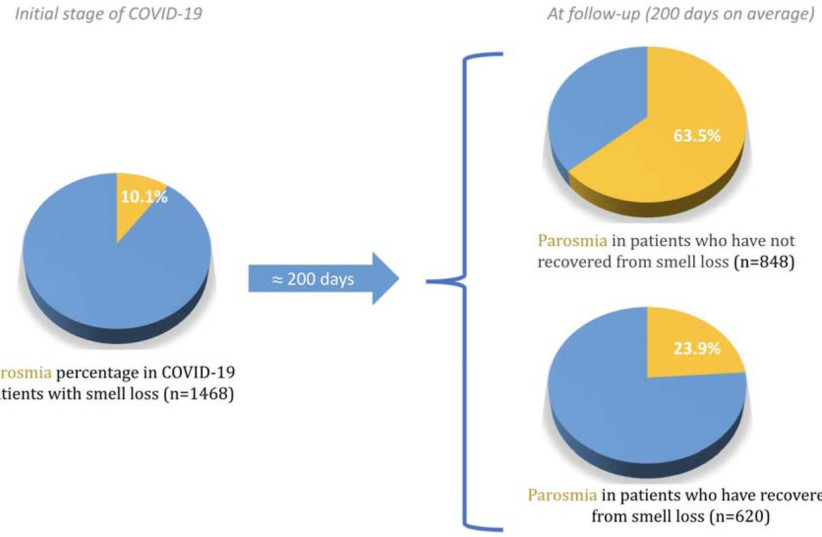
Νέα έρευνα δείχνει ότι η διάρκεια ζωής σε θερμά κλίματα όχι μόνο μειώνεται παθητικά από έναν αυξημένο μεταβολικό ρυθμό, αλλά ρυθμίζεται επίσης ενεργά από μια πρωτεΐνη του νευρικού συστήματος που ονομάζεται NPR-8, η οποία ελέγχει την έκφραση του κολλαγόνου. Διαπίστωσαν ότι τα σκουλήκια που δεν είχαν αυτή την πρωτεΐνη είχαν αυξημένη έκφραση κολλαγόνου σε θερμότερες θερμοκρασίες και έτσι εμφανίζουν αυξημένη αντοχή στο στρες, λιγότερες ρυτίδες του δέρματος που σχετίζονται με την ηλικία και μεγαλύτερη διάρκεια ζωής, γεγονός που υποδηλώνει ότι ο υποκείμενος μηχανισμός θα μπορούσε να χρησιμοποιηθεί για την παράταση της ανθρώπινης ζωής εν μέσω της παγκόσμιας αύξησης. θερμοκρασίες.. .
Για πολύ καιρό, οι επιστήμονες έχουν παρατηρήσει ότι πολλά πλάσματα τείνουν να έχουν μεγαλύτερη διάρκεια ζωής σε ψυχρότερα περιβάλλοντα από ό,τι σε θερμότερα. Πρόσφατες μελέτες για C. elegansένα είδος νηματώδους, υποδηλώνει ότι η μακροζωία μπορεί να σχετίζεται με μια συγκεκριμένη πρωτεΐνη στο νευρικό σύστημα που ρυθμίζει την παραγωγή κολλαγόνου, του κύριου συστατικού του δέρματος, των οστών και του συνδετικού ιστού σε μια ποικιλία ζώων.
Δεδομένου ότι η πρωτεΐνη σε C. elegans Είναι πολύ παρόμοιο με τις πρωτεΐνες των υποδοχέων του νευρικού συστήματος που βρίσκονται σε άλλες[{” attribute=””>species, including humans, this revelation could potentially bring us a step closer to finding methods to manipulate collagen production in order to slow human aging and enhance lifespan, particularly in the context of rising global temperatures. The research, led by a team from Washington State University, was published in the journal Aging Cell.
“Based on animal studies, scientists anticipate that human lifespan will go down in the future as climate change drives up the ambient temperature,” said senior author Yiyong (Ben) Liu, an assistant professor in the WSU Elson S. Floyd College of Medicine and director of the university’s Genomics Service Center. “We have found that warm temperatures leading to short lifespan is not a passive, thermodynamic process as previously thought, but a regulated process controlled by the nervous system. Our findings mean that down the road, it may be possible to intervene in that process to extend human lifespan as temperatures rise.”

Scanning electron microscopy images of the cuticle (skin) of C. elegans kept at 25 degrees Celsius show wrinkles on an old (9-day old) adult wild-type worm (left) but smooth skin on an npr-8 mutant worm of the same age (right). Yiyong (Ben) Liu, Washington State University
The researchers looked at a nervous system protein known as NPR-8 in the tiny soil-dwelling worm Caenorhabditis elegans (C. elegans), a commonly used model organism in aging research. During their study, they observed that worms lacking NPR-8 had fewer skin wrinkles as they aged. They also made the unexpected discovery that mutant worms kept at a warm temperature of 25 C (77 F) had increased collagen expression and lived longer than wild-type worms, which did not happen when the worms were kept at 20 C or 15 C (68 F and 59 F, respectively). To determine whether the neural regulation of collagens may play a role in aging and longevity, they conducted a series of additional experiments and analyses.
“What we saw was that the absence of NPR-8 caused an increase in collagen expression, which increased the worms’ stress resistance and lifespan and made them look younger than wild-type worms that were the same biological age,” said co-first author Durai Sellegounder, a former postdoctoral research associate in the WSU Elson S. Floyd College of Medicine who is now a scientist at the Buck Institute for Research on Aging.

Study author Durai Sellegounder uses a microinjection microscope to create genetically modified C. elegans for an experiment. Credit: Cori Kogan, Washington State University
In one experiment, the researchers reintroduced NPR-8 in mutant worms kept at 25 C and saw that this reverted the worms’ skin from smooth to wrinkled and significantly reduced the animals’ extended lifespan. Next, they showed that the extended lifespan of npr-8 mutant worms also held up under heat stress conditions, with mutant worms surviving significantly longer than wild-type worms when moved into a 35 C (95 F) environment. Additional experiments identified specific neurons responsible for regulating lifespan in response to warm temperatures and pointed to increased expression of collagens as a driver of the improved lifespan at warm temperatures.
The phenomenon of heat shortening lifespan has traditionally been explained by the rate of living theory, which suggests that heat speeds up an organism’s metabolism, causing it to use up its finite store of metabolic energy more quickly. While the researchers still found limited evidence supporting this idea, their study findings indicate that the nervous system also plays an active role in this process.
Given earlier findings that showed that worms lacking NPR-8 were more resistant to infection and oxidative stress, the researchers believe that the NPR-8-controlled increase in collagen expression boosts the animals’ resistance to stressful conditions such as excessive heat. Their next step is to delve deeper into the underlying mechanisms of how increased collagen production enhances stress resistance.
Reference: “The longevity response to warm temperature is neurally controlled via the regulation of collagen genes” by Sankara Naynar Palani, Durai Sellegounder, Phillip Wibisono and Yiyong Liu, 9 March 2023, Aging Cell.
DOI: 10.1111/acel.13815
In addition to Liu and Sellegounder, co-authors on the current study include co-first author and postdoctoral research associate Sankara Naynar Palani and postdoctoral research associate Phillip Wibisono, both of the WSU Elson S. Floyd College of Medicine.

“Ερασιτέχνης διοργανωτής. Εξαιρετικά ταπεινός web maven. Ειδικός κοινωνικών μέσων Wannabe. Δημιουργός. Thinker.”



